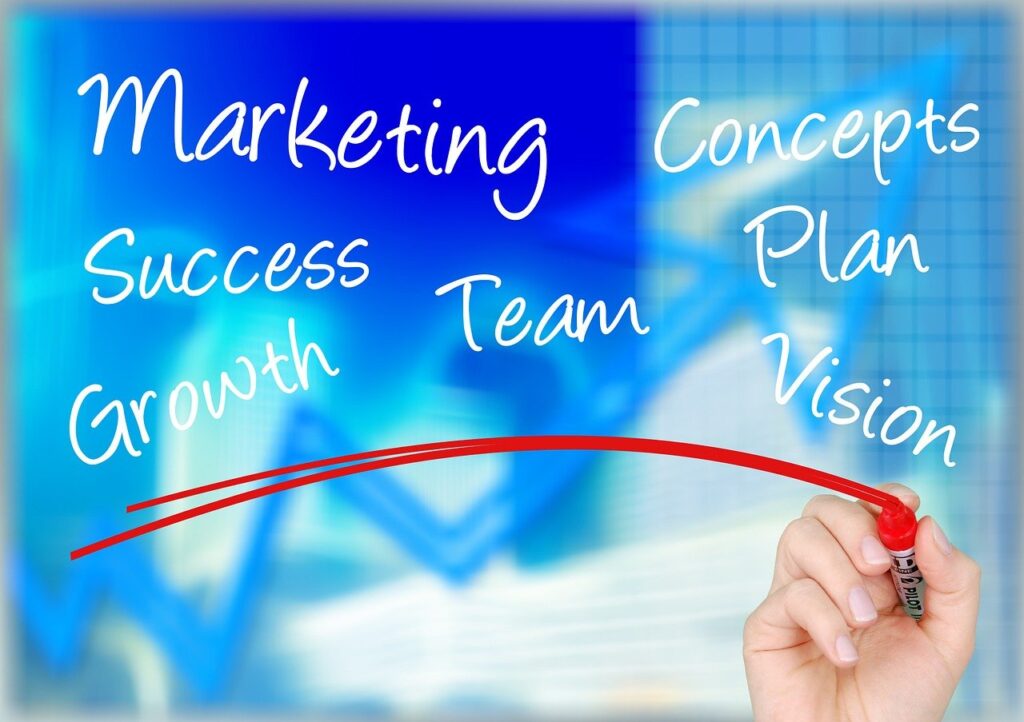Do you know the different types of marketing? Running a small business means wearing many hats, and one of the most critical roles is marketing your brand effectively. One of the types of marketing we'll discuss is direct marketing, a targeted approach where companies communicate directly with their audience through channels like snail mail, email, and social media.
But with so many marketing strategies and channels available, where do you even begin? This blog breaks down the most popular and effective types of marketing, giving you actionable tips and examples to help your business thrive.

What is Marketing?
At its core, marketing is the process of creating, communicating, and delivering value to customers. Market research is an essential step in understanding consumer behavior and preferences, which helps in creating effective marketing strategies.
It’s not just about flashy ads—it’s about building relationships, fostering trust, and ultimately persuading potential customers to choose your products or services. Done well, marketing helps your business grow by connecting your brand with its ideal audience.
Why Marketing Matters
Without the right marketing strategy, even the best product may go unnoticed. Effective marketing amplifies your brand awareness, engages your target customers, and encourages customer loyalty. That said, not all businesses need the same approach. The key is tailoring your efforts to align with your unique goals and audience.

Marketing Strategy 101
What Is a Marketing Strategy?
A marketing strategy is your guiding roadmap—it outlines how you’ll attract and retain customers while achieving your business goals. It’s a long-term plan that provides clarity on your target audience, the channels you’ll engage with, and the messaging you’ll use.
Looking for an experienced Wordpress Development company?
Developing a Strategy
To develop an effective marketing plan for your small business:
- Define Your Target Audience: Understand your ideal customer’s behavior, preferences, and needs. Use buyer personas to guide your efforts.
- Set Clear Goals: Are you focusing on increasing online sales, growing your email list, or establishing brand credibility? SMART goals—Specific, Measurable, Achievable, Relevant, Time-bound—are your best bet.
- Choose Marketing Channels: Where does your audience spend their time? Select platforms that maximize your visibility and reach.
With your strategy in place, you’re ready to explore different marketing tactics.

Digital Marketing Channels
Digital marketing has revolutionized how small businesses connect with customers. Inbound marketing is a strategy that focuses on attracting potential customers through digital tactics like SEO, content marketing, and email marketing. Here are key approaches to consider:
1. Search Engine Marketing (SEM)
SEM focuses on driving traffic through search engines like Google. By using paid advertising (e.g., Google Ads), your business becomes more visible to people actively searching for what you offer.
Key Tips for Effective SEM:
- Use targeted keywords that align with your products/services.
- Write engaging ad copy to capture attention (e.g., highlight benefits, use clear calls to action).
- Leverage ad extensions such as phone numbers or site links to improve visibility.
2. Social Media Marketing
With billions of active social media users worldwide, platforms like Facebook, Instagram, and TikTok are essential for building brand awareness, driving traffic, and engaging directly with customers.
Social Media Tips:
- Post engaging, shareable content. Use high-quality visuals, polls, and short-form videos.
- Experiment with paid ads to reach highly targeted audiences.
- Partner with influencers to boost credibility and reach.
- Utilize influencer marketing to build trust and engagement with established audiences, enhancing brand visibility and customer interactions through strategic collaborations.
3. Content Marketing
Content marketing provides free, valuable content (e.g., blog articles, videos, or eBooks) to establish trust with your audience and position your business as a thought leader.
Content Essentials:
- Invest in search engine optimization as a critical component of content marketing to improve your visibility in search engine results.
- Answer common questions that resonate with your target audience (e.g., “How to start a capsule wardrobe” if you’re a clothing brand).
- Promote content via email and social media for maximum reach.
4. Email Marketing
Email remains one of the most cost-effective ways to engage your existing customers and nurture potential leads.
Email Marketing Strategies:
- Personalize your messages using the recipient’s name and tailored recommendations.
- Write compelling subject lines that encourage readers to open.
- Use segmentation to send relevant content based on customer preferences.

Influencer & Partnership Marketing
Collaboration is a powerful tool for small businesses. Marketing professionals play a crucial role in driving business growth and shaping market perceptions. Here’s how you can tap into others’ networks:
1. Affiliate Marketing
Affiliate marketing enables you to pay commissions to partners who drive traffic or sales to your site.
Proven Techniques:
- Create a referral program to incentivize affiliates.
- Promote your program across social media platforms.
- Use analytics to track performance and reward top contributors.
2. Partner Marketing
Partnering with complementary brands lets you share audiences and reach new markets. For instance, a local bakery might team up with a coffee shop to cross-promote their products.
How to Start:
- Find businesses with overlapping target audiences.
- Host co-branded events, like coffee-and-cupcake pop-ups.
- Collaborate on joint promotions or giveaways.

Traditional Marketing Channels
While digital marketing dominates, traditional marketing still has its place in creating a holistic marketing mix.
1. Outbound Marketing
Outbound marketing involves actively reaching out to potential customers with branded messages, whether through TV ads, print marketing, or cold email.
2. Networking Events & Trade Shows
Attending events allows small businesses to form in-person connections. Event marketing is a strategy to engage the target audience and promote products through events like trade shows and sponsorships. Trade shows, for instance, create opportunities for conversation and lead generation.
3. Guerrilla Marketing
Guerrilla marketing focuses on unconventional tactics to generate buzz. Think of a creative street mural or a flash mob that captures attention instantly. Remember Coca-Cola’s “Happiness Vending Machine”? It handed out free Coke bottles, creating huge publicity.

Specialized Types of Marketing
Some businesses benefit from exploring niche strategies:
1. Account-Based Marketing (ABM)
ABM is particularly effective for businesses targeting specific high-value clients. It involves crafting personalized campaigns for individual accounts to win their business.
2. Cause Marketing
Cause marketing represents a commitment to social good. Partnering with non-profits or donating proceeds to charity resonates deeply with customers. Dove’s “Real Beauty” campaign, which championed body positivity, is the gold standard in this space.

Emerging Marketing Trends
As the marketing landscape continues to evolve, new trends are emerging that are changing the way businesses approach marketing. Staying ahead of these trends can give your small business a competitive edge. Here are some of the most significant emerging marketing trends:
1. Artificial Intelligence (AI) and Automation in Marketing
Artificial intelligence (AI) and automation are revolutionizing the marketing industry. AI-powered tools are being used to analyze customer data, personalize marketing messages, and automate repetitive tasks. For instance, AI can help you segment your audience more accurately, ensuring that your marketing materials reach the right people at the right time. Marketing automation platforms streamline processes, improve efficiency, and reduce costs by handling tasks like email campaigns, social media posting, and lead nurturing.
As AI and automation continue to advance, we can expect to see even more innovative applications in marketing. Imagine chatbots that not only answer customer queries but also predict what products they might be interested in based on their browsing history. By embracing AI and automation, small businesses can enhance their marketing efforts, making them more effective and efficient.
2. Voice Marketing and Conversational Marketing
Voice marketing and conversational marketing are becoming increasingly popular as more consumers use voice assistants like Alexa and Google Assistant to interact with brands. Voice marketing involves using voice-activated ads and content to reach customers. For example, a local restaurant might use voice search optimization to ensure it appears when someone asks, “Where can I find the best pizza near me?”
Conversational marketing, on the other hand, involves using chatbots and messaging platforms to have one-on-one conversations with customers. This approach allows businesses to provide instant responses to customer inquiries, improving customer satisfaction and engagement. For instance, a clothing store might use a chatbot on its website to help customers find the right size or style.
These trends are changing the way businesses interact with customers and are expected to continue growing in the coming years. By incorporating voice and conversational marketing into your strategy, you can create more personalized and engaging experiences for your customers.

Measuring Marketing Success
Measuring marketing success is crucial to understanding the effectiveness of your marketing efforts and making data-driven decisions. By tracking key performance indicators (KPIs), you can gain insights into what’s working and what needs improvement. Here are some essential KPIs that marketers use to measure success:
Key Performance Indicators (KPIs) for Marketing
KPIs are metrics that measure the success of your marketing efforts. Some common KPIs for marketing include:
- Website Traffic and Engagement Metrics: These metrics, such as page views, bounce rate, and time on site, help you understand how visitors interact with your website. High engagement indicates that your content is resonating with your audience.
- Social Media Metrics: Metrics like followers, engagement rate, and reach provide insights into your social media performance. They help you gauge how well your content is performing and how effectively you’re engaging with your audience.
- Lead Generation Metrics: Metrics such as lead volume, lead quality, and conversion rate help you assess the effectiveness of your lead generation efforts. High-quality leads and a strong conversion rate indicate that your marketing strategies are attracting the right audience.
- Conversion Metrics: These metrics, including sales, revenue, and customer acquisition cost, measure the ultimate success of your marketing campaigns. They help you understand the return on investment (ROI) of your marketing efforts.
- Return on Investment (ROI) Metrics: Metrics like return on ad spend (ROAS) and return on marketing investment (ROMI) help you evaluate the financial effectiveness of your marketing campaigns. Positive ROI indicates that your marketing efforts are generating more revenue than they cost.
By tracking these KPIs, you can gain valuable insights into the effectiveness of your marketing efforts and make data-driven decisions to optimize your marketing strategies. This approach ensures that you’re continually improving and achieving your business goals.

Overcoming Marketing Challenges
Small business owners often face:
- Limited Budgets: Focus on cost-effective strategies like email and UGC (user-generated content).
- Reaching the Right Audience: Use analytics to track who engages most with your efforts.
- Measuring Effectiveness: Use tools like Google Analytics to monitor ROI.
Learning to adapt and balance traditional and digital efforts ensures success.

Use Marketing to Grow Your Business
Understanding the different types of marketing is crucial for small businesses hoping to stand out. Whether you’re leveraging social media platforms, creating content marketing campaigns, or attending networking events, the right strategy can help you reach your target customers effectively.
If you’re ready to take your marketing one step further, Priceless Consulting provides web development and SEO services to ensure your messaging is clear, effective, and visible to those who need it most.
📩 Contact us today for a free consultation and elevate your marketing game!
Resources to Learn More About Marketing
Expanding your knowledge about marketing strategies can empower your business to thrive. Here are some credible resources to help you deepen your understanding of marketing principles and tools:
- HubSpot Marketing Blog – HubSpot offers a variety of articles, guides, and free courses on topics such as inbound marketing, email campaigns, and social media strategies.
- Google Digital Garage – A free learning platform by Google that provides comprehensive courses on digital marketing, SEO, and analytics.
- Moz – Moz is a trusted authority in search engine optimization (SEO) and offers educational content, tutorials, and tools for improving your online visibility.
- The Content Marketing Institute – This resource focuses on content marketing with blogs, research studies, and training programs to help businesses create impactful content strategies.
- American Marketing Association (AMA) – The AMA website provides industry reports, case studies, and webinars exploring all aspects of marketing, from traditional to digital techniques.
- Coursera – Marketing Courses – Access marketing courses from top universities and organizations to learn about branding, analytics, digital marketing, and more.
- HubSpot Academy – HubSpot Academy offers free online courses, certifications, and tutorials on inbound marketing, email marketing, social media, and content creation.
- Neil Patel's Blog – Neil Patel provides valuable insights, tips, and tools for SEO, content marketing, and analytics, helping businesses enhance their online strategies.
- Hootsuite – Social Media Marketing – Hootsuite delivers resources such as guides, webinars, and training focused on mastering social media marketing and managing online presence effectively.
- Google Digital Garage – This platform offers free online courses across topics like digital marketing, data analytics, and e-commerce, suitable for learners of all levels.
These resources provide actionable insights and guidance to enhance your marketing efforts, helping your business grow and connect effectively with your audience.







